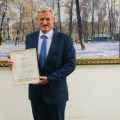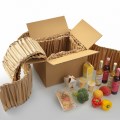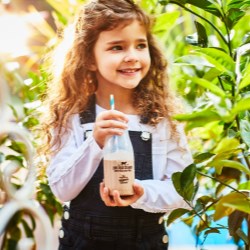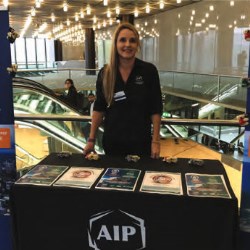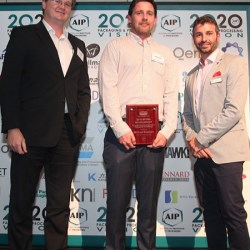If this is your company, CONTACT US to activate Packbase™ software to build your portal.
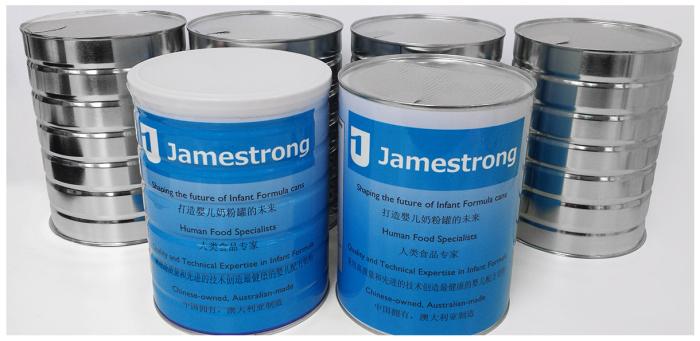

There was no chorus line of female dancers doing high kicks, splits and cartwheels but at the Kyabram factory of Jamestrong Packaging at Kyabram Victoria they sure can, can, can!
Jamestrong Packaging is a leading packaging supplier to some of Australia’s well- known brand owners. The largest supplier of aerosol cans and nutrition cans in Australasia invited members of Australian Institute of Packaging [AIP] to visit the factory.
Jamestrong Managing director John Bigley and Grant McConkey Kyabram Manufacturing Manager gave a comprehensive overview of the antecedents of the company and explained how things work and happen at the factory.
Metal packaging is one of the oldest forms of food packaging and is not only cost effective but one of the most recycled and sustainable packaging products available today Jamestrong Packaging has five manufacturing facilities located throughout Australia and New Zealand, operating in three distinct sectors - Food cans, Nutrition cans and Aerosol.
Jamestrong manufactures and supplies tinplate cans to the following key market segments:
- Dry Powder (infant formula, milk powder, adult nutrition)
- Food (soup, fruit and vegetables, meals)
- Dry beverage ( milk modifiers, coffee)
- Pet food (wet dog and cat food)
- Aerosols (personal care, household, industrial, pharmaceutical)
Tinplate food and nutrition cans are manufactured at Kyabram, Victoria and in Hastings, New Zealand. Diameters range from 52mm to 153mm, while ends can be supplied from 49mm to 153mm in diameter. In addition to ends manufactured in Hamilton, New Zealand, a wide range of innovative and market-leading convenience ends and components are available, including full aperture EZO (easy open) ends. All cans and ends can be supplied either plain or decorated.
After being outfitted in all of the necessary personal protection equipment and that needed to maintain the integrity of the cans being produced at world’s best practice rates the tour commenced. The whole management team were available as tour guides and to answer any questions arising.
Annually 141 million cans are produced and this number will be exceeded as new plant is installed. These are phenomenal rates and have more credence when you nlearn that the factory is approaching the end of year seven [7] lost time injury free.
Things that lead to this are fail safe zones around the machines that shut down if the area is breached, as one of our number found to his embarrassment. There is also a specific management role for continuous improvement and every employee is involved. All issues raised are followed to a satisfactory conclusion.
So we saw pallets of printed steel sheet [manufactured at Milperra] and can ends ready to be fed into the canmaking line. The printed sheets are slit into can blanks and the blanks then rolled to form a can before being fed into the machines that weld the side seam and seam on the end. They then take a tour of the factory before being palletised and stretch wrapped for transport to the customers.
Part of the process is for the finished cans to go through an air washer where the cans are turned over so any impurities are removed. Reflecting on the music hall, the cans were willing to show their tops and bottoms with the printed side resembling a flowing skirt. If only the chattering cans along the endless conveyors could rattle out the tune infernal galop!
Such is the cleanliness in the factory that an employee was seen dusting the internal fencing. Not scattering the dust, but using a spray that captured it. This culture will not be lost when new technology is introduced in an adjacent factory building.
In August 2015 Jamestrong purchased a 6500 square metre warehouse immediately beside the Kyabram, manufacturing plant. They commenced a project to install a new nutrition can line in this building to meet the increasing volume needs of its customers. A clean room is being built within the warehouse and will be set up so positive air pressure ensures that cans are meticulously clean.
This $8 million investment follows the company's recent $13 million investment in a world's best metal printer, enabling it to offer its customers an unsurpassed print and can making supply chain. [MetalStar 3 from KBA-MetalPrint Germany]
The new positive air pressure-enclosed can line has been specified to meet current and future requirements of the infant formula category. It will be set up with formally zoned hygiene-controlled areas meeting customers’ highest food safety expectations. The line will be fitted with in-line leak testing, air rinsing of cans, as well as state-of-the-art vision systems designed to allow comprehensive inspection for internal and external faults.
The project to install and commission this line is due for completion before the end of 2016. It will be dedicated exclusively to the manufacture of nutrition cans, enabling optimum security of secondary packaging.
The existing infant formula can line will continue to be equipped with its existing food safety testing and inspection equipment, and will provide contingent supply options as required.
The tour being over Carol Lawrence on behalf of the Institute thanked John and his staff and made a small presentation of a framed certificate together with a gift in packaging other than a can. A group photograph was taken and the visitors set out to continue their days work and reflect on what they had learnt.
Written by Michael B Halley FAIP


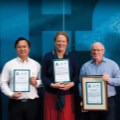
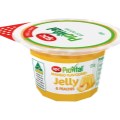
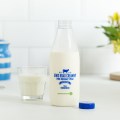
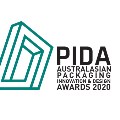
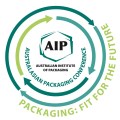
.jpg)



